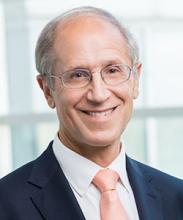Case Western Reserve University School of Medicine unites a vast network of students, faculty, staff, researchers and healthcare professionals across one university and five campuses that include four hospital affiliates. It’s an environment ripe for partnership that can lead to groundbreaking—and life-changing—education and discoveries.
This synergy helps drive the school’s theme for the 2024-25 academic year: innovation through collaboration. Read on to learn how Dean Stan Gerson, MD, sees this playing out across the school, including for medical education.
CWRU MEDICINE: What are some ways you are seeing innovation through collaboration in action?
DEAN GERSON: Innovation happens in our centers, which bring together experts from multiple disciplines, departments and partner institutions to focus on a crucial field of medical research. This transdisciplinary engagement yields incredible ideas coming from different perspectives and approaches, resulting in new discoveries and therapeutics.
With collaboration at their core, the centers successfully compete for large, multiple-investigator grants that further research. For example, the Case Comprehensive Cancer Center has developed a visionary approach to treating rare cancers, and the Digestive Health Research Institute is making tremendous strides for understanding and addressing devastating digestive diseases such as inflammatory bowel diseases.
We’re expanding our pursuit of discovery with the new Center for Artificial Intelligence in Drug Discovery and the Center for Mitochondrial Research and Therapeutics. Mitochondria are the energy powerhouse of cells, and defects in their activity are linked to numerous conditions, including neurodegenerative diseases, cancer, cardiovascular diseases and diabetes. And the new chair of the neurosciences department, Ronald Yu, PhD, will lead the new Brain Health Collective and critical research on neurodegenerative conditions and mental health.
CWRU MEDICINE: How do students and trainees benefit from the drive toward discovery?
DEAN GERSON: Our school does an exceptional job of preparing students—from high schoolers to postdoctoral fellows—to be directly involved in cutting-edge research with individual mentorship. Biomedical education is at the core of our research-focused centers. Plus, we have a dedicated Center for Medical Education, where leaders strive to improve curriculum to help the next generation of physicians and medical scientists become superb practitioners and apply novel discoveries into medical practice. Innovative training prepares students to apply their knowledge in patient care and laboratories, and with physicians and investigators.
CWRU MEDICINE: How has the pursuit of innovation in research and education at the School of Medicine evolved over time?
DEAN GERSON: We have a long history of innovation that includes the first successful defibrillation of the human heart, first creation of an artificial human chromosome and first stool DNA tests for early detection of colon cancer. The School of Medicine has benefited from exceptionally innovative leaders— such as Nate Berger, who passed away in June —whose work leaves indelible marks on medical education, research and the broader Cleveland community.


